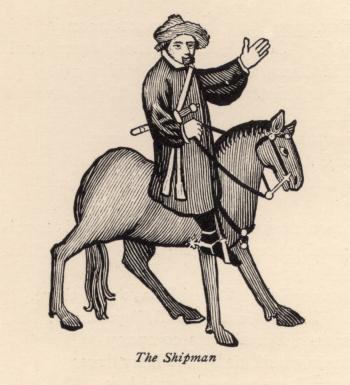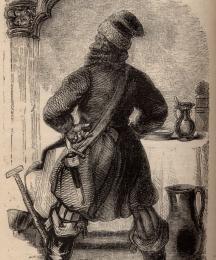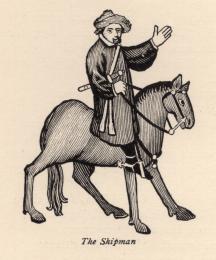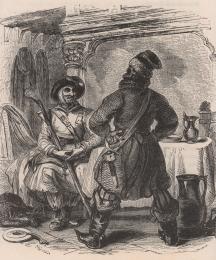
"A Shipman was ther, wonynge fer by weste;
For aught I woot, he was of Dertemouthe.
He rood upon a rouncy, as he kouthe,
In a gowne of faldyng to the knee.
A daggere hangynge on a laas hadde he
Aboute his nekke, under his arm adoun.
The hoote somer hadde maad his hewe al broun;
And certeinly he was a good felawe." (388-395)
The Shipman tells the story of a merchant and his wife. A young monk comes to stay with them and falls in love with the wife: she asks him for money to pay her debts, and he borrows it from the merchant. When the monk provides the money, the wife agrees to sleep with him. When the merchant asks for his money to be returned, the monk declares that he returned it to the wife and then leaves town. The merchant then confronts his wife, who says that she spent the money because she thought it was payment for the monk's lodging, not the repayment of a debt.
For aught I woot, he was of Dertemouthe.
He rood upon a rouncy, as he kouthe,
In a gowne of faldyng to the knee.
A daggere hangynge on a laas hadde he
Aboute his nekke, under his arm adoun.
The hoote somer hadde maad his hewe al broun;
And certeinly he was a good felawe." (388-395)
The Shipman tells the story of a merchant and his wife. A young monk comes to stay with them and falls in love with the wife: she asks him for money to pay her debts, and he borrows it from the merchant. When the monk provides the money, the wife agrees to sleep with him. When the merchant asks for his money to be returned, the monk declares that he returned it to the wife and then leaves town. The merchant then confronts his wife, who says that she spent the money because she thought it was payment for the monk's lodging, not the repayment of a debt.










